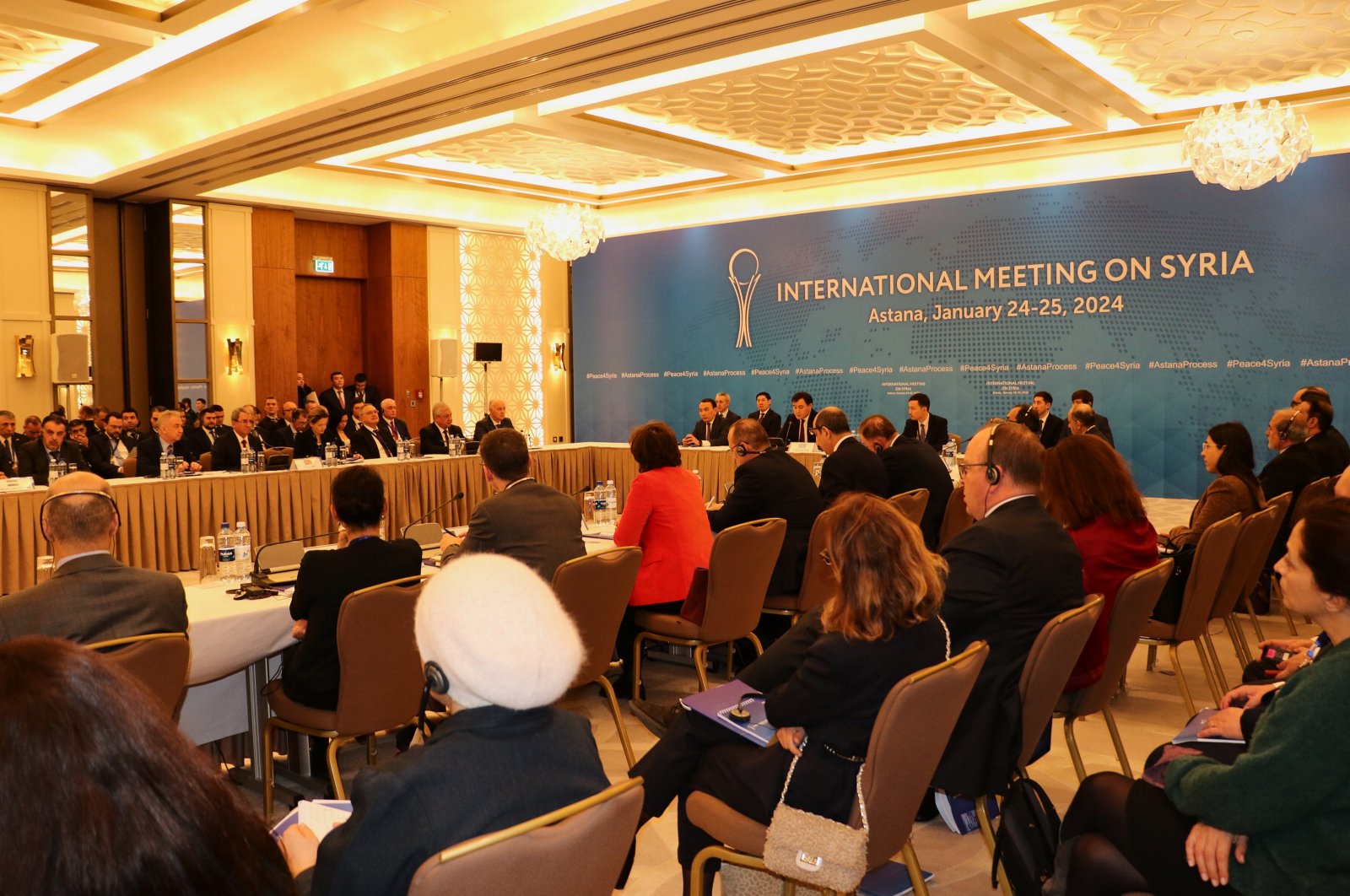
Türkiye, Russia, Iran and the UN, which participated in the 21st meeting of the Astana format, underlined that Syria should not be forgotten amid the crises in Palestine and Ukraine while urging for a political process to solve the Syrian crisis
The Astana guarantors, Türkiye, Russia and Iran, on Thursday reiterated their call for a political solution in war-torn Syria, and called on the Syrian Constitutional Committee to step up its work and rejected the projections of terrorist groups in the country.
Türkiye was represented by Deputy Foreign Minister Ahmet Yıldız, while Russia was represented by its Special Envoy to Syria Alexander Lavrentiev, Iran by Ali Asghar Khaji, a senior adviser to the Iranian foreign minister on special political affairs, the Syrian opposition by Ahmet Toma and the regime by deputy foreign minister Bassam Sabbagh.
Speaking to journalists following the meeting in the Kazakh capital Astana, Yıldız said: "As the Turkish side, we suggested that the work of the Constitutional Committee be initiated and accelerated because the solution will ultimately come through a political process.”
Noting that the guarantor countries of the Astana format talks are on the same page on this issue, Yildiz said the basic setting for this should be a human rights-based constitution that "reflects an acceptable, modern and fair representation so that the crisis in Syria does not repeat itself again."
"The work of this committee will begin when the location is agreed upon," he said.
Yildiz said the 21st meeting in this format expressed concern about the possible repercussions of the ongoing clashes in the Palestinian-Israeli conflict, adding they are all in agreement in criticizing Israel and that it should not spread the conflict to Syria and Lebanon.
He went on to say that the meeting emphasized that Syria should not be forgotten amid the crises in Palestine and Ukraine and that aid should continue and be increased "in parallel with the deterioration of the economic situation in Syria."
In this regard, Yildiz said they underlined that the Assad regime should not discriminate and impose unacceptable conditions on the delivery of humanitarian aid.
"Ultimately, the U.N.'s role in solving the Syrian problem will continue. In general, support from the international community will be required," he said.
"Türkiye has incurred a lot of costs due to the Syrian crisis. This includes migrants and refugees, but there are operations beyond that. There are terrorist acts. All of this is a cost. I hope that with the political solution in Syria, Syria will become a good neighbor of Türkiye," he said.
In a written statement, the sides expressed their determination to continue working against terrorism and stand against separatist agendas aimed at undermining the sovereignty and territorial integrity of Syria and threatening the national security of the neighboring countries.
They condemned activities of terrorist groups and their affiliates operating under different names in various parts of Syria, including attacks targeting civilian facilities that cause civilian casualties and highlighted the need to fully implement all arrangements related to the north of Syria.
Referring to the PKK’s Syrian wing, the YPG, the guarantors rejected "illegitimate self-rule initiatives under the pretext of combating terrorism.” They also reiterated their opposition to the continued illegal seizure and transfer of oil resources that should belong to Syria.
The PKK/YPG is known to derive its funds from oil wells, which are Syria’s biggest, in regions they occupied after the departure of Daesh.
U.S. forces in the area have placed PKK/YPG terrorists to guard these oil fields when they moved into the territory after Türkiye launched Operation Peace Spring in October 2019 against the PKK/YPG and Daesh.
Within this scope, the sides also expressed concern against oppression by the separatist groups against civilians east of the Euphrates, which recently led to clashes with Arab tribes in the region, including "forced conscription, suppression of peaceful demonstrations, and discriminatory practices in the field of education as well as restrictions placed on political activities, journalists, right to assembly and freedom of movement.”
Countries supporting these terrorist elements were also condemned for undermining the unity of Syria.
U.S. support for the PKK/YPG, including weapons shipments and training, has long strained ties between Washington and Ankara. Successive U.S. administrations have refrained from designating the YPG as a terrorist group, despite Türkiye's repeated objections.
Delegations from Jordan, Iraq and Lebanon, which have observer status, also attended the talks, which are also attended by the United Nations Deputy Special Representative for Syria Najat Rochdi.
The Astana peace process is the ensemble of initiatives and plans launched in 2017 under the guarantors Türkiye, Russia and Iran to resolve the Syrian civil war, which began in early 2011 when the Bashar Assad regime cracked down on pro-democracy protestors with unexpected ferocity. The war displaced nearly 7 million people and caused the deaths of over 300,000 people in total.
It was stated that the 22nd International Meeting on Syria would be convened in the second half of 2024 again in Astana.
